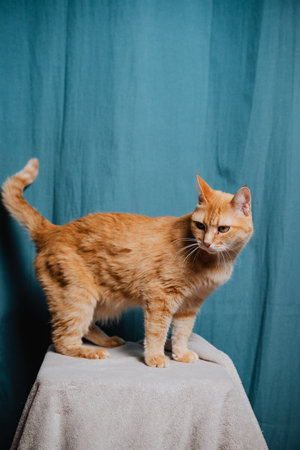1. Introduction to Exotic Mammals in British Flats
The allure of exotic mammals as pets has captured the hearts of many across the UK, with a noticeable uptick in their popularity among urban dwellers. From sugar gliders and hedgehogs to pygmy goats and ferrets, these unique companions offer an alternative to traditional cats and dogs, bringing a touch of the extraordinary into everyday life. However, for those residing in British flats, embracing this trend comes with its own set of challenges and responsibilities. Unlike detached houses or countryside cottages, flats often mean closer neighbours, limited outdoor space, and stricter tenancy rules. This makes it especially important for prospective owners to consider not only the welfare of their exotic pets but also the impact on their immediate environment—particularly when it comes to managing allergies and odours. As more Britons seek to share their homes with these fascinating animals, understanding the nuances of flat living is essential for fostering a harmonious relationship between pets, owners, and neighbours alike.
Understanding Common Allergies and Odour Concerns
Living with exotic mammals in British flats presents unique challenges, particularly when it comes to managing allergies and odours. Unlike traditional pets such as cats and dogs, exotic mammals—including ferrets, sugar gliders, and hedgehogs—often produce allergens and scents that are unfamiliar and sometimes more potent. These issues can become especially problematic in the compact living spaces typical of many UK homes, where ventilation may be limited and rooms are closely connected.
Typical Allergens Associated with Exotic Mammals
Exotic mammals can trigger allergic reactions through various means. Common sources include dander (tiny skin flakes), saliva, urine, and bedding materials. For instance, the musky scent of ferret skin oils or the powdery dander from rodents can linger in soft furnishings and carpets, quickly spreading throughout a small flat.
| Exotic Mammal | Common Allergen Sources | Notable Odour Issues |
|---|---|---|
| Ferret | Dander, Saliva, Urine | Strong musky body odour; pungent urine smell |
| Sugar Glider | Dander, Scent Glands | Scent marking; sweet but persistent odours |
| Hedgehog | Dander, Faeces | Mild musky odour; faecal smells if not cleaned regularly |
| Rodents (e.g. Rats, Mice) | Dander, Urine, Bedding Dust | Ammonia-rich urine smell; lingering cage scent |
Why Allergies and Odours Are Challenging in British Flats
The structure of many British flats intensifies these concerns. With limited square footage, soft furnishings close to animal enclosures, and often only single-glazed windows or minimal mechanical ventilation, allergens and odours can build up rapidly. Open-plan designs further allow airborne particles to travel between kitchen, living room, and sleeping areas without obstruction.
Cultural Considerations in the UK Context
British flats frequently feature wall-to-wall carpeting and heavy curtains for insulation against chilly weather—both of which trap allergens and scents. Furthermore, with unpredictable weather limiting how often windows can be kept open, natural air circulation is often insufficient for keeping indoor air fresh. These factors make it crucial for owners of exotic mammals to adopt proactive management strategies tailored to British homes.

3. Ventilation and Air Filtration for Flat Dwellers
Living with exotic mammals in a British flat presents unique challenges when it comes to maintaining fresh air and keeping allergens at bay. Flats, especially those in older buildings or urban areas, often suffer from limited airflow and close quarters, which can exacerbate odours and airborne particles. Improving ventilation is key. Whenever weather and security permit, open windows for cross-ventilation—particularly after cleaning cages or handling bedding. For those who can’t rely on natural airflow due to city noise or pollution, mechanical solutions are essential.
Air Purifiers: Choosing the Right Device
Investing in a quality air purifier fitted with HEPA filters is one of the most effective ways to capture dander, dust, and even the musky scents that some exotic pets emit. Brands like Dyson and Levoit, readily available across the UK, offer compact units suitable for flats. Ensure your chosen model is appropriately sized for your living space; a unit too small will struggle to make a difference. Place purifiers near pet enclosures or wherever you notice odours accumulating.
Home Adaptations to Enhance Air Quality
If you’re renting, removable draught excluders and window vent trickle vents can be installed without breaching tenancy agreements. These help boost fresh air circulation without dramatic heat loss during colder months—a common concern in Britain’s climate. Consider extractor fans for kitchens and bathrooms, as moisture from these rooms can intensify pet smells. Regularly clean extractor fan filters to keep them operating efficiently.
Additional Tips for Flat Dwellers
Beyond mechanical aids, simple habits make a difference: wash pet bedding frequently using unscented detergents to avoid masking odours with chemicals that might irritate sensitive noses. Avoid using heavily fragranced sprays; instead, opt for odour-neutralising gels (such as Neutradol or Oust) placed discreetly near enclosures but out of pets’ reach. For carpeted flats, regular vacuuming with a machine fitted with a HEPA filter helps remove settled allergens before they circulate again.
4. Hygiene and Cleaning Routines Suited to British Homes
Keeping a flat clean and fresh when living with exotic mammals requires special consideration, especially in the context of British housing where space is often limited and neighbours are close by. Establishing effective daily routines can significantly reduce allergens and odours, making your home comfortable for both you and your pets.
Choosing Locally Sourced Cleaning Products
Opting for cleaning products that are readily available in the UK is both convenient and environmentally friendly. Many British brands offer unscented or pet-safe options that minimise irritation for allergy sufferers and sensitive animals alike. Here’s a quick comparison of popular choices:
| Product | Main Use | Pet-Safe? |
|---|---|---|
| Ecover All-Purpose Cleaner | General surfaces | Yes |
| Zoflora Pet Fresh Disinfectant | Floors, cages, litter trays | Yes (when diluted) |
| Bicarbonate of Soda | Odour neutraliser | Yes |
| Astonish Antibacterial Surface Cleanser | Kitchens & bathrooms | Yes |
Daily Maintenance Habits to Control Odours and Allergens
- Ventilation: Open windows daily, even for a short time, to allow fresh air circulation without letting pets escape.
- Litter Tray Management: Scoop out soiled bedding at least twice a day; use biodegradable litter sourced from UK suppliers.
- Cage Cleaning: Wipe down surfaces with pet-safe disinfectant every day, deep-clean weekly to prevent build-up.
Laundry and Soft Furnishings Care
Cushions, throws, and bedding should be washed regularly using non-bio detergents like Persil Non-Bio, which are gentle on skin and reduce the risk of allergic reactions. Vacuum soft furnishings with HEPA-filter vacuums (such as Dyson or Henry models commonly found in Britain) to remove dander effectively.
Respecting Neighbours in Shared Buildings
If you live in a flat with shared corridors or ventilation systems, be mindful of cleaning agents’ scents and always dispose of waste in sealed bags. Regularly wipe down door handles and communal entryways to limit allergen spread. By combining these locally tailored routines with the right products, you’ll maintain a pleasant environment for everyone—both within your household and throughout your building.
5. Allergy-Friendly Handling and Enclosure Tips
Living in a British flat with exotic mammals means sharing your personal space, so it’s essential to keep both your health and your pet’s welfare in mind. Here are practical ways to interact with your animal companions while reducing allergens and keeping odours at bay.
Safe Interaction Practices
Always wash your hands before and after handling your exotic mammal. Wearing gloves or long sleeves can provide an extra barrier, especially if you’re prone to allergies. Try to limit cuddling sessions directly on soft furnishings—opt for a designated play mat or washable blanket instead. If friends or family visit, make sure they know how to handle your pet safely and hygienically.
Enclosure Maintenance for Allergen Control
Spot-clean your pet’s enclosure daily, focusing on removing droppings, soiled bedding, and leftover food promptly. Choose hypoallergenic bedding materials such as recycled paper or aspen shavings rather than dusty straw or hay. A weekly deep clean with mild, pet-safe disinfectant will help eliminate lingering odours and reduce allergen build-up.
Improving Air Quality in Small Spaces
Investing in a HEPA air purifier can make a noticeable difference in the air quality of your flat. Good ventilation is key—open windows when possible, but always ensure enclosures are secure from draughts and escape attempts. For extra freshness, natural odour absorbers like baking soda placed near (but not inside) the enclosure can help tackle any musty smells without overwhelming sensitive noses.
Laundry and Soft Furnishings
Soft items such as blankets, towels, and cushion covers should be washed frequently at high temperatures to remove fur and dander. Consider using throws over sofas and armchairs that can be easily swapped out and laundered. This simple habit helps prevent allergens from embedding themselves into fabrics around your home.
By integrating these mindful handling routines and cleaning strategies into your daily life, you’ll create a healthier environment for both you and your exotic mammal—making small-space living in the UK more comfortable for everyone involved.
6. Building a Support Network and Seeking Veterinary Advice
Living with exotic mammals in a British flat can be a truly rewarding experience, but it also comes with its own set of challenges—especially when it comes to managing allergies and odours. One of the best ways to navigate these hurdles is by connecting with others who share your passion. Joining local exotic pet communities, whether online or in-person, allows you to swap tips on minimising allergens and odour, as well as discuss the unique quirks of different species. In the UK, there are several active forums, social media groups, and even local meet-ups for exotic pet keepers—don’t hesitate to reach out and get involved.
Finding Exotic Pet Vets in the UK
Unlike more common pets, exotic mammals require vets with specialised knowledge. It’s essential to locate a veterinary practice nearby that is well-versed in caring for your particular species. Start by checking the Royal College of Veterinary Surgeons (RCVS) website for practices with exotics experience. You can also ask fellow keepers in your support network for recommendations—word-of-mouth is often the most reliable route to finding a skilled exotics vet. Remember, regular check-ups and prompt attention to health concerns are vital not just for your pet’s wellbeing but also for managing potential allergy triggers at home.
Allergy Specialists: A Key Resource
If you or someone in your household begins experiencing allergic reactions, it’s wise to consult an allergy specialist. The NHS provides referrals to local allergy clinics where you can receive tailored advice and treatment options specific to animal allergens. Don’t underestimate the value of expert guidance—it can make all the difference in creating a harmonious living environment for both humans and animals.
Support Through Shared Experience
By building connections within the UK’s exotic pet community and seeking professional advice when needed, you’ll be better equipped to tackle any issues that arise. Together, these resources form a solid foundation of support, ensuring that life with your extraordinary companions remains comfortable, healthy, and full of joy.
7. Conclusion: Creating Harmony in Flat Living
Successfully sharing your British flat with exotic mammals is entirely possible when mindful routines and thoughtful practices are put into place. By prioritising air quality through regular ventilation and the use of HEPA filters, you can significantly reduce allergens and odours. Maintaining a strict cleaning schedule, including frequent bedding changes and spot cleaning, further ensures a fresh and hygienic environment for both you and your pets. Investing time in understanding your chosen species’ needs—such as selecting the right enclosures, enrichment, and diet—helps promote animal welfare while minimising disruptive behaviours that could affect neighbours. Clear communication with neighbours about your pet ownership fosters goodwill, especially if you proactively address potential concerns regarding noise or scents. Finally, seeking out local veterinary advice and connecting with responsible breeders or rescue centres ensures both compliance with UK regulations and support for ethical animal care. Through these combined efforts, British flat dwellers can enjoy the unique companionship of exotic mammals while maintaining a healthy home, respecting communal living spaces, and nurturing positive neighbourly relations.


